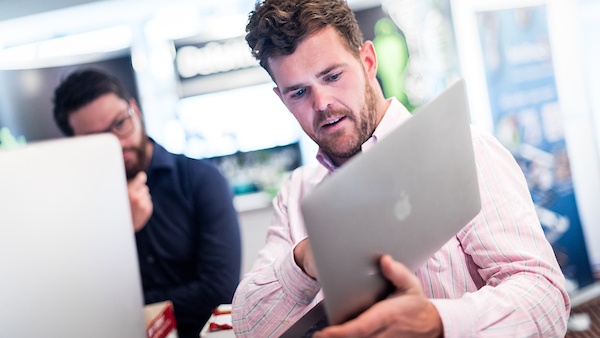Are you confident that your company has an amazing employee benefits scheme, but aren’t sure how to get your colleagues interested in and engaged with it? Sometimes, you need to get a little creative with your communications and campaigns. At Reward Gateway, we’ve tried and tested plenty of different methods – both with our own staff and with clients – so we’ve learned a lot about what works to increase employee benefits uptake.
Here are some of our most effective strategies for getting employees to learn about – and love – their benefits…
Get a little competitive
Friendly competitions are a great way to encourage people to register or log into your programme. If you’ve reached a bit of a plateau in terms of driving employees to your employee engagement platform, where you host your benefits, then it might be a good idea to consider running a week- or even month-long employee communications campaign that encourages people to register or log in online and they'll be entered into a competition, which is a good first step in improving employee benefits utilisation rates.
The prize doesn’t have to be big, but it should be something you know your employees will appreciate – such as a voucher for a retailer of their choice, or a bottle of wine.
Reward Gateway can support you both in creating the campaign and pulling the data for you at the end for a winner to be selected at random.
Download our eBook for more creative ways to communicate employee perks »
Get social, and go where the eyes are
We all know that as employees, we receive a lot of emails every week, and it’s hard to be heard over all that noise. That’s why recently, we've been running more campaigns through Slack and other employee communications channels.
People expect to see social content here, so are more likely to engage with less formal and more engaging posts using GIFs, short videos and fun images.
We recently ran a 12-week campaign like this on Slack for one client, and saw a definite spike in registrations, logins and spend through the platform. If you don’t already use these channels, it's worth considering adding a social channel into your communications matrix. It can help to engage offline workforces, and is a great way to reduce the reliance on emails and printed collateral for your communications.
Tell a story
We should never underestimate the power of great storytelling in employee communications. People are more likely to sign up to benefits if they know that their colleagues are using and loving them. To that end, it’s a good idea to seek out the great stories of how people are using the benefits to enhance their lives.
Whether that’s making great savings on trips out with the kids or improving their health and fitness by signing up to Cycle to Work schemes, it’s an excellent way for employees to hear about their benefits and how they can improve their lives from their peers – not just from HR. We recently worked with some clients on Cycle to Work stories, and some of their employees’ experiences were truly amazing – far more effective than any email or poster we could have created.

Use the power of your people
Over recent months, we have worked with more managers to equip them with the information they need to raise awareness about the benefits that are available to their employees. For many employees, the only person they come into regular contact with is their line manager, so it makes a lot of sense to add this into your channel mix. We work with some clients to help them give their managers monthly talking points – this is also a great way to get feedback on what is and isn’t working, or any awareness gaps about the benefits.
Now it’s just a matter of getting creative with the communications surrounding your employee benefits programme. Remember, it’s all about what works for your company and reflects its values. Tell me, what's worked for you in the past?

 Pippa Arthur-Van Praagh
Pippa Arthur-Van Praagh




